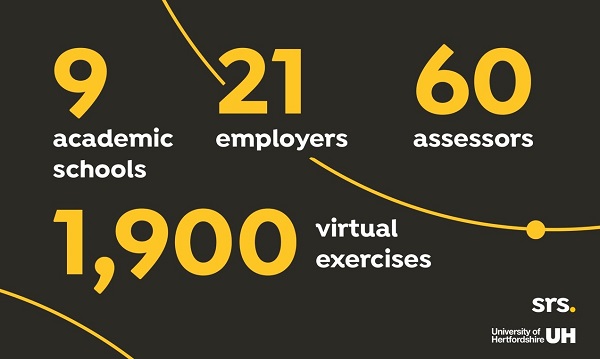Research by The Bridge Group (2017) found that students from lower socio-economic backgrounds participate less in activities that have greatest currency amongst employers.
This applied to around 42% of University of Hertfordshire (UH) students who were first in their family to attend university, which can result in a lack of knowledge of graduate recruitment processes.
Working with UH, SRS Recruitment and Employability Experts (SRS) aimed to level the playing field for disadvantaged students by preparing students for the competitive reality of the assessment centre.
Together they saw an opportunity to create an embedded inclusive, and realistic assessment centre experience for over 3,000 students.
The UH and SRS Assessment Centre Experience (ACE) team set out to engage with students across a range of disciplines and cohorts with differential outcomes. Their work has won an ISE award for outstanding university and employer partnership.
The core objectives for the ACE team were:
- To enable level 5 students to take part in a compulsory assessment centre simulation
- To increase the number of industrial placements secured by students
- To enhance employer relationships
- To boost student confidence and skills to enable students to enter the job market successfully
The plan of action
A nine-month project plan was developed between SRS and UH Careers and Employment Service (CE) to ensure the event was delivered smoothly. This work involved consultation with academics on how best to support their students, and with employers to ensure that the experience was reflective of an employer’s assessment centre.
These stakeholders were also invited to assess, observe, and network with the students during and in between the exercises. In particular, employers had the opportunity to share information and talent-spot as part of the assessment centre.
Laura Vincent, University Recruiter at Citrix said: “It allows you a really targeted way of reaching students that might not come across your brand otherwise.”
SRS and CE produced in-depth digital assessment platform instructions, video tutorials, and technical support guides as part of a comprehensive student communication plan. They made sure this was an inclusive opportunity where students using a range of different devices or with particular needs could confidently participate.
Working with nine academic schools, 21 employers, and 60 assessors, SRS and CE designed and delivered nine interactive webinars, 1,900 virtual exercises and gave digital feedback for every student.

With input from everyone into the schedule, material design, assessor training, feedback criteria and the assessment platform, ACE was delivered in 24 half-day digital assessment centres over 12 days. Students took part in three exercises: a one-to-one interview, a pre-prepared presentation and a group exercise.
The impact was clear from the start
Against core objectives, the partnership achieved the following:
- ACE is embedded into level 5 modules for nine schools where academics now give higher priority to employability. By embedding these activities we reach students who otherwise do not engage in typical career development activities.
- The work of the ACE team has underpinned a lot of employability activity, leading to high levels of employment in the Destination of Leavers from Higher Education survey (96.5%, DLHE 16/17). UH’s Longitudinal Education Outcomes are also excellent. It is second to the University of Cambridge for median salary five years after graduation.
- ACE is now endorsed as a key UH employability strategy. It has improved student engagement with CE and boosted engagement with employers. Between 2017 and 2019 appointments increased by 70.6%, event registration by 47.5% and users of online services by 30.2%. It also led to CE winning the Collaborative Award for Teaching Excellence.
- Confidence to apply for graduate roles or placements increased by an average of 53% across all nine schools. This broke down into a confidence increase of 139% for group tasks, 163% for presentation exercises and 134% for interviews.
Since being embedded into the curriculum, ACE gives over 3,000 students a year the opportunity to practise and prepare for the competitive reality of a graduate employer’s assessment centre.
Students lacking in social and cultural capital have since been able to successfully navigate recruitment processes and their confidence levels have increased by an average of 53%.
Nick Shipp, Senior Lecturer at UH said: “Students recognise how important it is for life after university and building up their skills.”
As explained by one UH student, “It was amazing, my first ever experience of an interview and presentation for a job role. Very helpful and I’ve gained loads of confidence from this experience alone. I have severe social anxiety, however this programme ran smoothly for me and definitely boosted my confidence.”


0 Comments